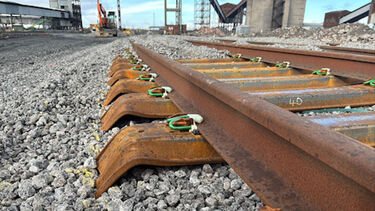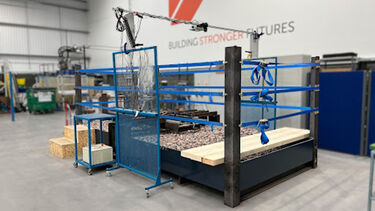Decarbonisation of steel in low carbon rail transport networks
Engineering performance, sustainability metrics, and business models to drive the optimisation of steel in low carbon transport networks

Jacob’s research focuses on the sustainability of steel railway infrastructure and how it can be used to support desperately needed low-carbon transport systems across the world. Future sustainability in the transportation sector will require, and rely heavily on, a shift from personal to public transportation, which must be supported by a sustainable rail system that is built on sustainable rail infrastructure – a substantial portion of which is produced by British Steel.
Rail networks are almost unique in the transport sector because they are demonstrably able to deliver a low carbon mass transit and freight system.CO2 equivalent emissions per passenger are at least half when compared to vehicular personal transportation. Unfortunately within current rail infrastructure, steel accounts for approximately 43% of the embedded carbon; which is the largest material portion. However, rail steel has the potential to be recycled through either the Basic Oxygen Steelmaking (BOS), or Electric Arc Furnace (EAF) route. Currently, this unique property of steel is exploited in a limited way due to legacy infrastructure and procedures.
To support this goal Jacob is working on developing a tool that combines engineering, environmental and economic factors to enable decision makers to make better choices about the infrastructure they use in a given installation. He is focused on developing this tool using railway sleepers, a key component of this infrastructure, as a case study. Consequently, his research has led to the development of a bespoke test rig to investigate how railway sleepers behave as well as building computer-based models to understand the impact on the environment.
The findings from this project, and tools developed from this research will be used by rail industry infrastructure suppliers (British Steel) and infrastructure operators (e.g. Network Rail) to make better, more holistic choices about product deployment which will enable longer service life, cleaner manufacturing, and a more circular economy. This will hopefully mean that this research plays an important role in paving the way for a net-zero economy underpinned by a low carbon transport system.
I am really enjoying working towards an Engineering Doctorate (EngD) through the Advanced Metallics System Centre for Doctoral Training (CDT) - in part, due to the opportunity to work at British Steel R&D facility in Rotherham and have support from world leading colleagues.
Jacob Whittle
Jacob is a researcher at The University of Sheffield studying towards an EngD with the Centre for Doctoral Training in Advanced Metallic Systems within the Faculty of Engineering. He is a member of the Rail Innovation and Technology Centre. His research focuses on the sustainability of steel railway infrastructure and how it can be used to support desperately needed low carbon transport systems across the world.
He also holds learning and teaching responsibilities as Doctoral Supervisor of Railway Challenge at Sheffield, Graduate Teaching Assistant in the Faculty of Engineering and Open Day Ambassador.

Study with us
Study for a fully-funded PhD or EngD in Advanced Metallic Systems to explore innovative materials and manufacturing routes to increase sustainability and performance.

